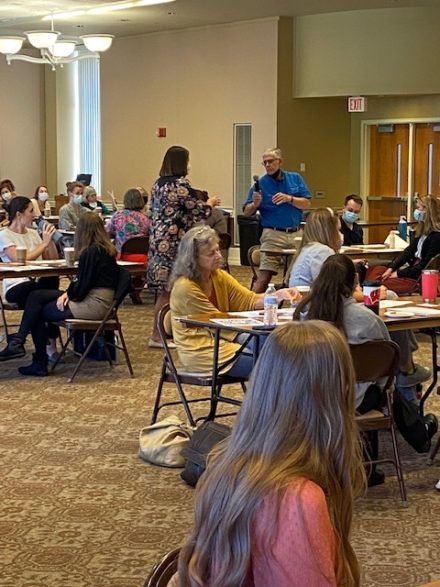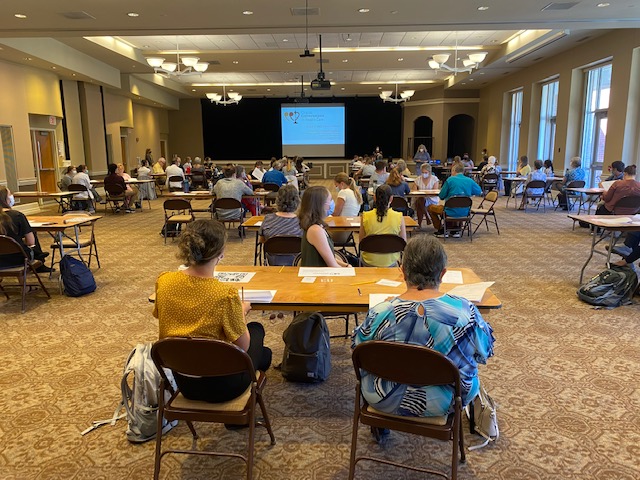The event was held for the fourth consecutive year in Moseley Center on Aug. 31.
Dr. Nadia Tremonti, a pediatric palliative care physician, so truthfully spoke, “if we wait until a family has clearly become ready to talk [about advanced care and end of life planning], we have woefully failed this family.”
On Wednesday, Aug. 31, Crucial Conversations was offered for the fourth consecutive year.
This year, Dianne Person, director of the Anatomical Gift Program along with Tracey Thurnes, associate professor of physician assistant studies and director of Accelerated Pathways Program, Antoinette Polito, associate professor of physician assistant studies and Jacqueline Debrew, associate professor of nursing and RN/BSN coordinator, planned a blended session to include second-year Master of Physician Assistant Studies students and Accelerated Bachelor’s of Science in Nursing students.

The programs hosted 37 second-year Master of Physician Assistant Studies students, 14 Accelerated Bachelor of Science in Nursing students, and 26 community volunteers. All gathered in McKinnon at the Moseley Center for the fourth session of Crucial Conversations event.
The session opened with keynote speaker, Risa Hanau, a licensed social worker, and clinical and community educator, who, in the delivery of her keynote, invited participants to engage in conversations relative to anticipated difficult health care and personal conversations. Hanau encouraged having these types of conversations sooner than later, indicating that later can often be too late. “What I know is that our health care system and society does not put value on what we are doing today, and that is being who we are.”
The interactive event partnered students with community volunteers to design a supportive space for holding difficult conversations. Students and community volunteers used design thinking practices to help better prepare for the crucial end-of-life conversations they will have as health care practitioners and patients, fostering humility, empathy, compassion, and respect.
The goal is to foster opportunities for mutual and reciprocal learning that ensure everyone — students, and community volunteers — leaves the workshop equipped to have crucial conversations with their health care professionals and their families.
The session provided skills to give voice, connection and meaning to health care providers, patients, and their families as they explore difficult and challenging conversations in health care. The interactivity was designed to achieve this and will be accomplished collaboratively. Participants’ experiences, vulnerabilities, and willingness to share creatively determine mutually beneficial outcomes.
“Crucial Conversations allowed me to reflect on my areas discomfort,” Physician Assistant Studies Program student Anna Bilse G’22 said. “By recognizing my areas of discomfort, I will be able to grow as a physician assistant who is considerate and empathetic to the discomfort and hesitancies my patients and their loved ones may be experiencing when discussing advanced care planning and end of life. Through the mutual recognition that these crucial conversations in health care are difficult and likely uncomfortable, we will be able to increase patient-provider trust, allowing for increased advocacy for our patients and their wishes.
“It was meaningful for students from the department of nursing to join the PA students and have the chance to practice difficult conversations with the volunteers from Twin Lakes and the Village of Brookwood,” said Associate Professor in the Department of Nursing Jacqueline Debrew. “It was especially meaningful because some of the nursing students, by chance, were paired with retired nurses. The community volunteers embraced the students and openly shared their stories and seemed eager to get to know the students and contribute to their educational journeys. This was the perfect culmination to the nursing students’ course on end-of-life care in nursing.”
“Risa Hanau was an informative speaker,” said ABSN student Brian Williamson G’22. “She exposed death, to me, in a way that it can be easier to embrace. She made it clear that being prepared for the end of life is so valuable to both the patient and the family. Exploring advanced directives and the experiences we had with the community members and the PA students was a great way to end our Crucial Conversation course in the ABSN program.”
“Illness and injury can befall anyone at any time and some of the resulting conditions are very challenging,” said community volunteer and retired registered nurse, Ann Kelly. “Nothing can replace a ‘crucial conversation’ when medical decisions need to be made. Thank you, Elon School of Health Sciences, for gifting community volunteers with an opportunity to engage with students in your various programs about this important topic. Everyone benefits and I am grateful.”
The session will be held again in 2024 and will continue as a co-learning course in School of Health Sciences curriculum. “Thought I had it all wrapped up, but this opened up new pathways to explore,” said one community volunteer.



